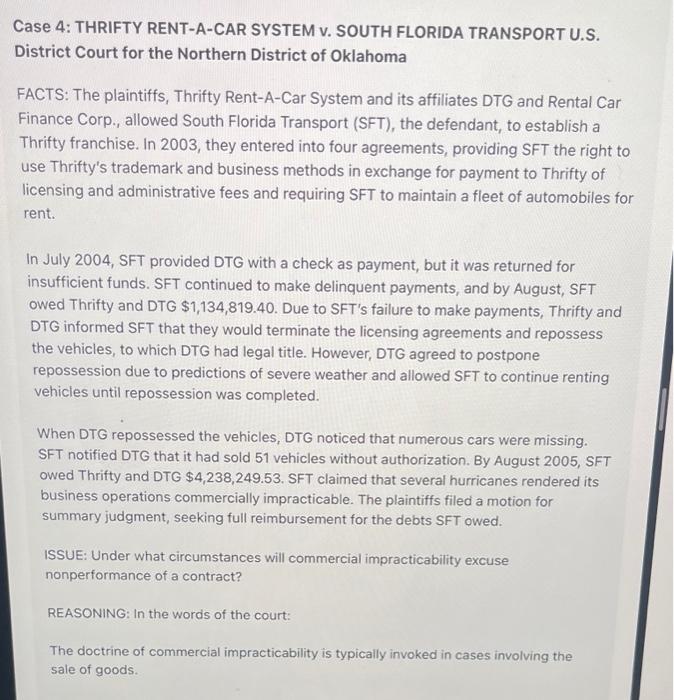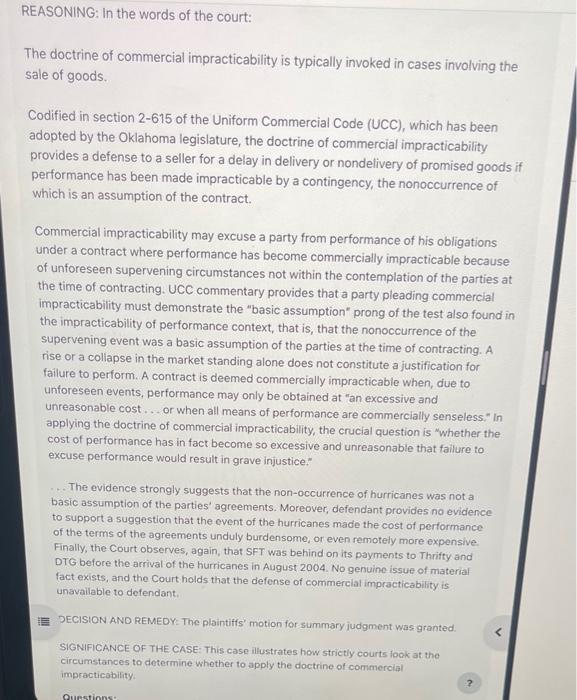ase 4: THRIFTY RENT-A-CAR SYSTEM v. SOUTH FLORIDA TRANSPORT U.S. District Court for the Northern District of Oklahoma EACTS: The plaintiffs, Thrifty Rent-A-Car System and its affiliates DTG and Rental Car Finance Corp., allowed South Florida Transport (SFT), the defendant, to establish a Thrifty franchise. In 2003 , they entered into four agreements, providing SFT the right to use Thrifty's trademark and business methods in exchange for payment to Thrifty of licensing and administrative fees and requiring SFT to maintain a fleet of automobiles for rent. In July 2004 , SFT provided DTG with a check as payment, but it was returned for insufficient funds. SFT continued to make delinquent payments, and by August, SFT owed Thrifty and DTG \$1,134,819.40. Due to SFT's failure to make payments, Thrifty and DTG informed SFT that they would terminate the licensing agreements and repossess the vehicles, to which DTG had legal title. However, DTG agreed to postpone repossession due to predictions of severe weather and allowed SFT to continue renting vehicles until repossession was completed. When DTG repossessed the vehicles, DTG noticed that numerous cars were missing. SFT notified DTG that it had sold 51 vehicles without authorization. By August 2005, SFT owed Thrifty and DTG $4,238,249.53. SFT claimed that several hurricanes rendered its business operations commercially impracticable. The plaintiffs filed a motion for summary judgment, seeking full reimbursement for the debts SFT owed. ISSUE: Under what circumstances will commercial impracticability excuse nonperformance of a contract? REASONING: In the words of the court: The doctrine of commercial impracticability is typically invoked in cases involving the sale of goods. REASONING: In the words of the court: The doctrine of commercial impracticability is typically invoked in cases involving the sale of goods. Codified in section 2-615 of the Uniform Commercial Code (UCC), which has been adopted by the Oklahoma legislature, the doctrine of commercial impracticability provides a defense to a seller for a delay in delivery or nondelivery of promised goods if performance has been made impracticable by a contingency, the nonoccurrence of which is an assumption of the contract. Commercial impracticability may excuse a party from performance of his obligations under a contract where performance has become commercially impracticable because of unforeseen supervening circumstances not within the contemplation of the parties at the time of contracting. UCC commentary provides that a party pleading commercial impracticability must demonstrate the "basic assumption" prong of the test also found in the impracticability of performance context, that is, that the nonoccurrence of the supervening event was a basic assumption of the parties at the time of contracting. A rise or a collapse in the market standing alone does not constitute a justification for failure to perform. A contract is deemed commercially impracticable when, due to unforeseen events, performance may only be obtained at "an excessive and unreasonable cost ... or when all means of performance are commercially senseless." In applying the doctrine of commercial impracticability, the crucial question is " whether the cost of performance has in fact become so excessive and unreasonable that failure to excuse performance would result in grave injustice:" The evidence strongly suggests that the non-occurrence of hurricanes was not a basic assumption of the parties' agreements. Moreover, defendant provides no evidence. to support a suggestion that the event of the hurricanes made the cost of performance of the terms of the agreements unduly burdensome, or even remotely more expensive. Finally, the Court observes, again, that SFT was behind on its payments to Thrifty and DTG before the arrival of the hurricanes in August 2004. No genuine issue of material fact exists, and the Court holds that the defense of commercial impracticability is unavailable to defendant. 1 DECISION AND REMEOY: The plaintiffs' motion for summary judgment was granted. SIGNIFICANCE OF THE CASE: This case illustrates how strictly courts fook at the circumstances to determine whether to apply the doctrine of commercial impracticability. 1. Especially given the increased rates of severe weather and natural disasters witnessed recently around the world, to what extent can parties entering into contracts reasonably be expected to plan for the effects of a rapidly changing global climate? 2. What values do you think are furthered by the decision in this case? What values are being subordinated by this decision









